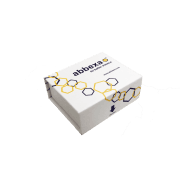Loading...
Protein Wnt-5a (Wnt5a) Antibody (Biotin)
proveedor
Abbexareference
abx446443Tested Applications
WB, IHCreactivity
Humanstatus
RUOclonality
PolyclonalDescripción
Wnt5a Antibody (Biotin) is a Rabbit Polyclonal against Wnt5a.
Características del producto
category
Primary Antibodies
clonality
Polyclonal
reactivity
Human
immunogen target
Protein Wnt-5a (Wnt5a)
host
Rabbit
conjugation
Biotin
tested applications
WB, IHC
purification
Peptide Affinity Purified
buffer
PBS, pH 7.4, 50% glycerol, 0.09% sodium azide.
size 1
100 µg
storage
Aliquot and store at -20°C. Avoid repeated freeze/thaw cycles.
or code
Wnt5a
dry ice
No
availability
Shipped within 5-12 working days.
uniprot id
NCBI accession
NP_001243034.1
note
This product is for research use only.
Quizá le pueda interesar
Mouse Wnt5a(Protein Wnt-5a) ELISA Kit

proveedor
FineTestreference
EM0497reactivity
mousestatus
RUOPrecio a consultar
Ver másRecombinant Human Wnt5a

proveedor
FineTestreference
P5172Tested Applications
Western Blot,ELISAstatus
RUOPrecio a consultar
Ver másProtein Wnt-5a (Wnt5a) Antibody

proveedor
Abbexareference
abx001745Tested Applications
WBreactivity
Human, Mouse, Ratstatus
RUOclonality
PolyclonalWnt5a Antibody is a Rabbit Polyclonal antibody against Wnt5a. The WNT gene family consists of structurally related genes...
175€ (20 µl)
Ver más